Case Study – Resilient Housing Recovery and Prevention in Türkiye

Hakan Akgun
Türkiye Country Program Manager
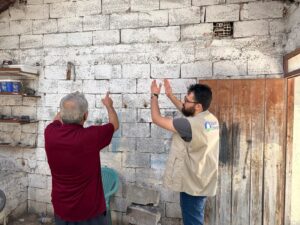
Introduction
On February 6, 2023, southeastern Türkiye was hit by two powerful earthquakes measuring 7.8 and 7.5 in magnitude, affecting 11 provinces, rendering more than 280,000 buildings uninhabitable, and displacing millions of people. This disaster not only caused extensive structural damage but also had a profound socio-economic impact on affected communities.
The disaster highlighted the physical vulnerability of Türkiye’s housing sector and evidenced the need to implement preventative initiatives that reduce damage caused by future earthquakes and other disaster risks in the country.
Retrofitting existing homes to be earthquake resistant is a crucial strategy for building long-term resilience. Post-disaster periods present a unique window of opportunity to implement stronger building codes and encourage homeowners to invest in structural improvements. This requires public awareness campaigns, financial incentives, and streamlined access to retrofitting resources. By emphasizing the long-term benefits of enhanced safety and reduced future damage, communities can work towards creating more robust housing stock, ultimately minimizing the impact of subsequent disasters.
Our post-disaster work in Türkiye, which started with a reconnaissance and housing subsector study and was complemented by a comprehensive analysis through our Resilient Housing Ecosystem Assessment (RHEAT)™ methodology, has supported the development of two primary objectives for both post-disaster and prevention activities: 1) Deploy quality systems for implementing resilient housing programs at scale, including BCtap, our end-to-end management platform that guides replicable changes in the way homes are built (for technical and non-technical stakeholders); prioritizes quality control, transparency, and accountability; and supports increased investment to meet demand; and 2) Determine levels of resources required by households to cover the costs of a permanent, disaster-resilient, healthy place to live, and advocate for viable financing models.
Since April 2023, we have made significant headway in our work in Türkiye. Activities we have carried out to date, in support of our primary objectives outlined above, include:
- Used BCtap to evaluate structural integrity of earthquake-affected homes and provided technical assistance and administrative support to 518 earthquake- affected homeowners;
- Established two Resilience Beacons, offering build-back-better and prevention advice, training and advocacy to homeowners and community members;
- Collaborated with local NGOs and civil society groups, including women-led organizations, to present resilient housing solutions to 25 partners and government institutions, leading to strategic partnerships that support post-disaster services—including women-centered legal advice, psychosocial support, and awareness raising—while promoting the long-term sustainability of recovery and prevention efforts;
- Completed a pilot retrofit on an earthquake-affected house in Hatay, demonstrating the feasibility of retrofitting existing housing to be disaster resilient.
Build Change has engaged with a wide range of stakeholders, including earthquake-affected homeowners, government officials, engineers and local civil society organizations, to implement activities that raise awareness of housing resilience and engage actors along the housing value chain to promote localized, resilient construction techniques and solutions.
This project leverages Build Change’s proven methodology for resilient housing, which have been successfully implemented in other countries, adapting it to Türkiye’s context to develop a scalable and sustainable model. We are proud to note that our work in Türkiye has prioritized a gendered approach, with 55% of the total people reached to date being women and girls.
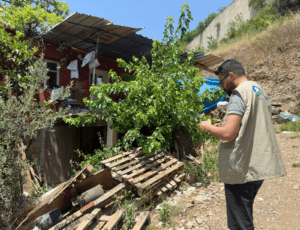
BCtap supported evaluation of earthquake-affected homes
Build Change partnered with a Syrian refugee-owned engineering partner, training their engineers to use BCtap, Build Change’s digital technical assistance platform, to conduct zoning-based post-earthquake house evaluations in earthquake affected regions. This survey identified structural risks for earthquake-affected homeowners residing in hard-to-reach areas and villages. Together, we evaluated 473 homes, the majority of which were located in Hatay and Kilis, with additional evaluations conducted in Adana and Kahramanmaras.
These evaluations enabled homeowners to have peace of mind in the aftermath of the earthquake, knowing that their homes were safe to continue living in, or what the steps were needed to ensure their home would not collapse in future disasters.
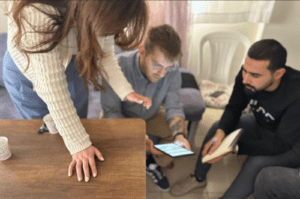
Technical assistance and administrative support to earthquake- affected homeowners
As mentioned above, Build Change Türkiye used BCtap to support homeowners with technical construction support for earthquake-resistant housing. This included a variety of services, including risk assessments, engineering solutions, and construction monitoring. Our technical assistance includes inspection of load-bearing systems, wall cracks, and soil conditions to determine the overall structural integrity of the home as well as retrofitting needs.
Homeowners receive guidance on strengthening options, including customized plans from our design library, engineering modifications for safer construction, a list of approved materials for strengthening, technical training for local builders, on-site supervision by engineers, and final safety inspections upon project completion.
Additionally, over the past two years, Build Change Türkiye has worked with homeowners in Hatay and Adana, offering critical guidance on legal rights, property documentation, and government permitting processes. This includes support in obtaining essential documents such as zoning certificates, title deeds, soil studies, and construction licenses—key components in ensuring earthquake-resistant construction. We also emphasized the importance of securing proper construction permits, as these directly affect eligibility for post-disaster assistance. In parallel, we informed families about how to access government funding designated for those affected by earthquakes.
We are continuing this work and building upon sustainable results, including through the establishment of Resilience Beacons, with one now open in Hatay and another opening in Izmir, in the Bornova district, soon. Our Resilience Beacons provide direct technical support to homeowners, including various options for housing designs available through our design libraries. We also provide training to homeowners on resilient home construction and builder training to increase the capacity of the local workforce in resilient construction practices and techniques. The Resilience Beacon in Hatay supports rebuilding efforts there, while the Izmir Resilience Beacon will support prevention efforts in a district whose population of over 3 million faces a high risk of earthquake impact.
Local partnerships and coordination with civil society
Build Change has built strong partnerships with local authorities, engineering chambers, civil society organizations, and community leaders to enhance disaster risk reduction and community resilience. These collaborations play a key role in both fieldwork efforts and the planning of sustainable, long-term prevention efforts.
Build Change partnered with a local NGO, Deprem Dayanişma Derneği, led by women who have returned to their hometowns in rural Türikye to support post-earthquake rebuilding and recovery. We will be collaborating on a number of activities, encouraging women in their network to attend homeowners’ capacity building trainings to learn about resilient housing solutions, and working together to impact local construction practices to be earthquake resilient.
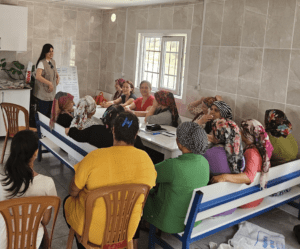
Pilot retrofit on earthquake-affected house in Hatay
To demonstrate the feasibility of retrofitting existing housing for disaster resilience, we completed a pilot retrofit of the earthquake-damaged home of Ganim Ekmekçi, a local resident whose wife and daughter-in-law died in the 2023 earthquake, and whose son sustained severe injuries resulting in a lifelong disability.
After his home collapsed, he built a temporary shelter using door panels next to an old, long-abandoned house on his farmland. Ganim sought technical support to strengthen the earthquake-damaged, abandoned existing structure on his land. When Build Change did structural evaluations of his home, it was determined that he would be a good candidate for retrofitting, and his home was selected as a pilot retrofit in the region. Build Change engineers initiated the retrofitting process and identified the most suitable solutions using the BCtap technical assistance platform.
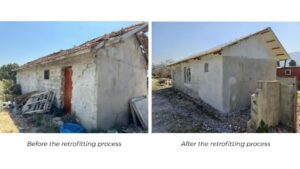
To define the intervention proposal, a participatory design process was conducted with the homeowner, who was actively involved throughout design and construction and received ongoing technical training.
The structure’s walls were reinforced, and a secure steel roof was installed to improve the home’s safety. This approach demonstrated that strengthening existing structures can be a viable alternative for other homeowners in areas where new construction is restricted.
Conclusion
Our efforts have demonstrated significant potential in improving the safety and sustainability of vulnerable communities in Türkiye’s earthquake-affected areas and in strengthening the country’s recovery process overall. From our experience in the field over the last two years, public perception is that construction is extremely expensive and only wealthy people can have a house that is earthquake-resilient. Build Change’s approach is changing this perception by demonstrating that key strategic techniques can be adopted by a variety of homeowners at many socioeconomic levels to make their homes disaster resilient.
Credits to: Ariana Karamallis, Hakan Akgun and Noll Tufani
Support resilient housing worldwide
Join us in preventing housing loss caused by disasters.
Donate nowNewsletter
Sign up for our newsletter to receive updates on our latest news, events, and more.